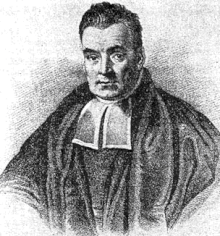
Back توماس بايز Arabic توماس بايز ARZ Tomas Bayes Azerbaijani توماس بیز AZB Томас Баес Byelorussian Томас Бейс Bulgarian টমাস বেইজ Bengali/Bangla Thomas Bayes Catalan Thomas Bayes Czech Thomas Bayes Welsh
Thomas Bayes | |
|---|---|
 | |
| Born | c. 1701 London, England |
| Died | 7 April 1761 (aged 59) Royal Tunbridge Wells, England |
| Alma mater | University of Edinburgh |
| Known for | Bayesian statistics Bayes' theorem Conditional probability Inverse probability Bayes prior Bayes factor Bayesian inference See full list |
| Scientific career | |
| Fields | Probability |
| Signature | |
Thomas Bayes (/beɪz/ BAYZ ; c. 1701 – 7 April 1761[2][4][note 1]) was an English statistician, philosopher and Presbyterian minister who is known for formulating a specific case of the theorem that bears his name: Bayes' theorem. Bayes never published what would become his most famous accomplishment; his notes were edited and published posthumously by Richard Price.[5]
- ^ Terence O'Donnell, History of Life Insurance in Its Formative Years (Chicago: American Conservation Co:, 1936), p. 335 (caption "Rev. T. Bayes: Improver of the Columnar Method developed by Barrett.")
- ^ a b Bayes's portrait The IMS Bulletin, Vol. 17 (1988), No. 3, pp. 276–278.
- ^ Bellhouse, D. R. (1 February 2004). "The Reverend Thomas Bayes, FRS: A Biography to Celebrate the Tercentenary of His Birth". Statistical Science. 19 (1): 3. Bibcode:2004StaSc..19....3B. doi:10.1214/088342304000000189. ISSN 0883-4237.
- ^ Belhouse, D.R. The Reverend Thomas Bayes FRS: a Biography to Celebrate the Tercentenary of his Birth Archived 5 March 2016 at the Wayback Machine.
- ^ McGrayne, Sharon Bertsch. (2011). The Theory That Would Not Die p. 10., p. 10, at Google Books
Cite error: There are <ref group=note> tags on this page, but the references will not show without a {{reflist|group=note}} template (see the help page).
© MMXXIII Rich X Search. We shall prevail. All rights reserved. Rich X Search